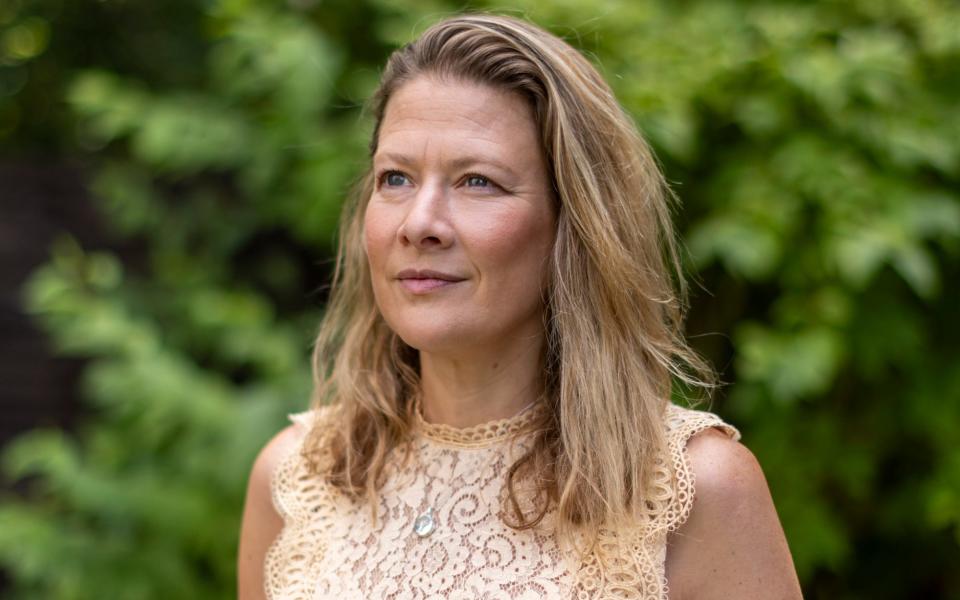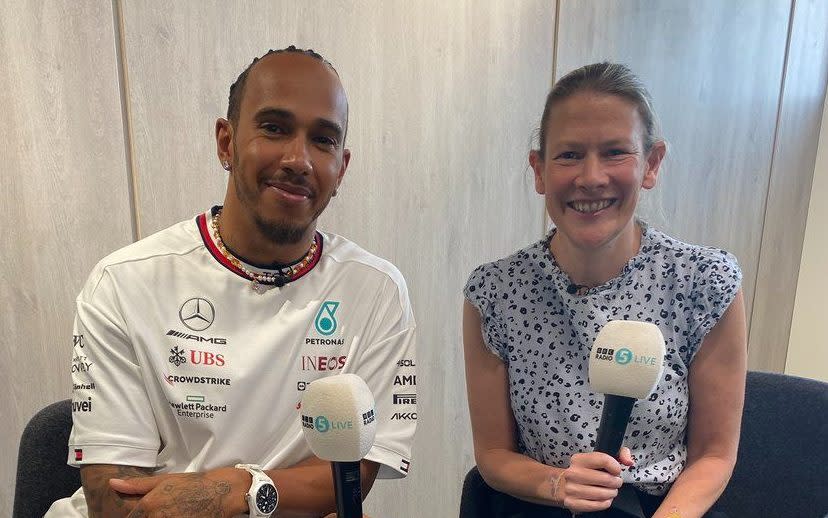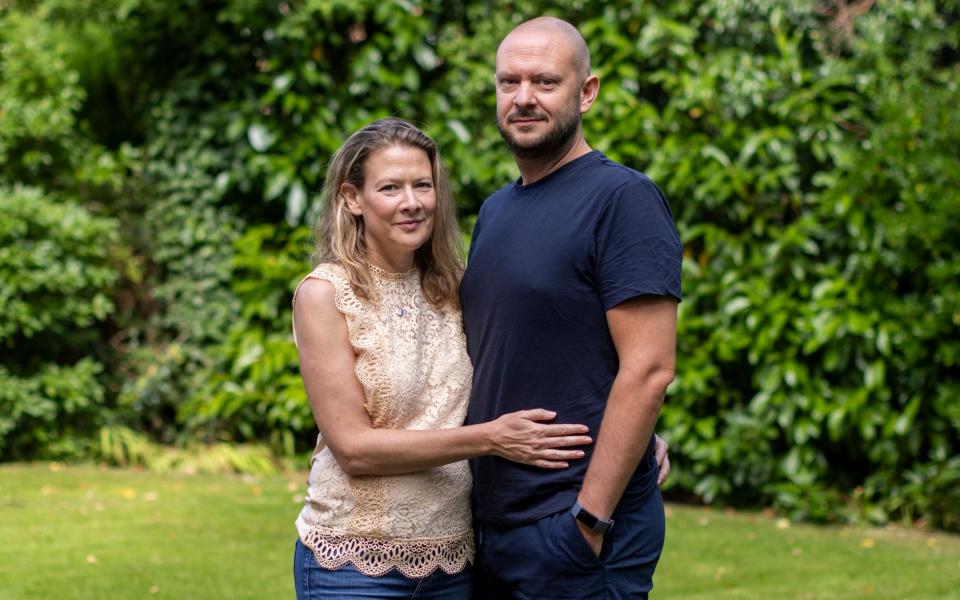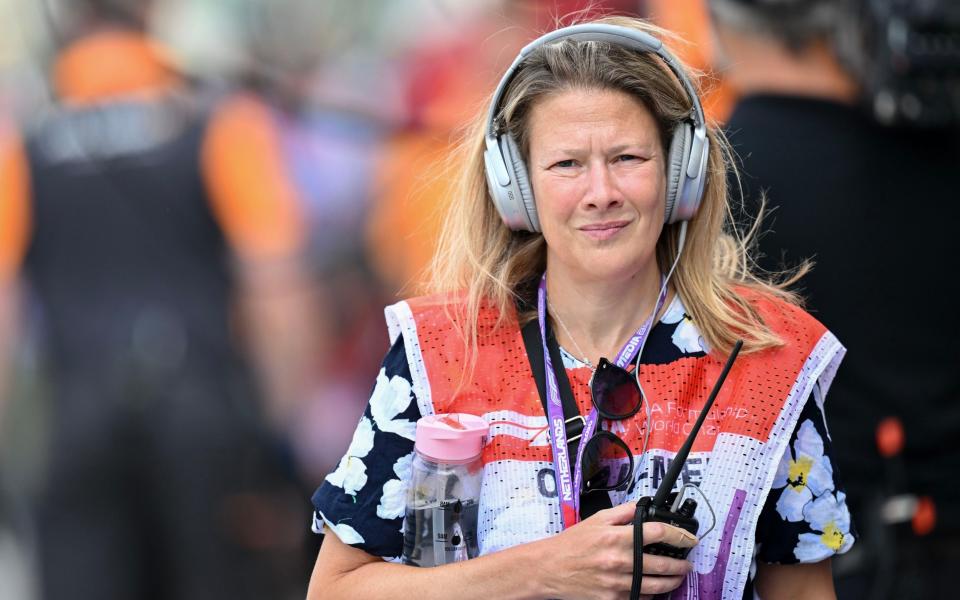Jennie Gow: I wonder if the BBC wants me back presenting F1 after my stroke

The day, December 29 last year, had begun in typical post-Christmas fashion. A lazy start. Crumpets for breakfast. Not that Jennie Gow felt much like eating. Laid low with the flu and a nasty cough over the festive period, she had taken to sleeping on the downstairs sofa so as not to disturb husband Jamie Coley and their six-year-old daughter Isabelle.
What happened next changed their lives forever.
Gow, a familiar voice to BBC Radio 5 Live listeners as the station’s F1 pitlane reporter, and to Netflix viewers as a talking head on the smash hit Drive to Survive series, went to the loo at around 9.30am. Thereafter her memories become patchy. “I remember certain things,” she says. “Quite specific things. It’s like looking through a shutter. Surreal.”
Jamie, a producer for Sky Sports, will never forget. “I heard a big thud,” he says. “I was aware of the fact that I’d not really seen Jen for 10 minutes, or heard her. And then there was this loud noise so I went to check. We have a loose open-door policy with toilets in this house…” “Well yeah, we have a six year old,” Jennie interjects.
What Jamie found was his wife slumped on the floor. “I kind of ran in,” he says. “She had her trousers around her knees so I assumed she had tried to get up from the loo, and just keeled over. I was looking for blood, looking for lumps. I was like ‘Jen, Jen, talk to me!’ No response. Her eyes were sort of looking into the middle-distance, beyond me. I rang 999.”
What had actually happened was Gow had suffered a stroke. They later learned that the carotid artery on the left side of her neck had torn due to her coughing, an “extremely rare” occurrence. A blood clot had flown up the damaged vessel and caused the stroke on the left side of her brain.
Sitting in the garden of their home in Sandhurst nine months later, Gow looks almost back to her former self. She talks and moves a bit more slowly than before, and stumbles over a few words during the course of a couple of hours. But she has made incredible strides considering she has had to relearn to speak, read and write.
‘Being back in the paddock wiped me out for 10 days’
In July, just six months after suffering her stroke, Gow was back in the F1 paddock for the first time at Silverstone, conducting a special one-to-one interview with Lewis Hamilton for BBC Radio 5 Live, which she admits had been the “dream” early in her recovery. Three weeks ago she returned for an entire race weekend at Zandvoort.

That experience proved to be both a positive, in that she “loved being back and loved seeing everyone again” and a negative, in that it “wiped her out for the next 10 days”. Gow admits she is unsure when or if she will be able to return full-time. She was only really able to do the Dutch weekend because Jamie was there to chaperone her, and because her employers were so understanding, allowing her to rest and miss sessions as needed.
“I had to go for a nap in [McLaren director of communications] Steve Atkins’s office at McLaren at one point, just because I couldn’t make it up to my [commentary] booth,” she says. “Bless her, the lady at the front desk at McLaren thought we were joking when we said we were there for a nap.”
‘It wasn’t sinking in for Jen’s mum’
Still, when they think back to December 29 last year they know how far she has come. Both Gow and Coley get tearful when describing the terrifying hours and days that followed her collapse. Jamie recalls Isabelle peering around the door of the loo and seeing her mum in distress. “I was trying to give her things to distract her,” he says. “I was like ‘Go get me some cushions for mummy’s head’. Or ‘Go and see if you can open the door because the ambulance will be here soon’.”
The dash to Frimley hospital where Coley told the doctor to “level with him, how serious are we talking?” To which the doctor replied: “Very. It could be fatal.” The call to Jennie’s parents to alert them to what had happened and struggling to impress upon Jennie’s mum the gravity of the situation. “It wasn’t sinking in,” he says. “Jen’s mum was like ‘What do you mean?’ And I blurted out: ‘She could die.’ That was when Iz kind of clocked what was going on.” Gow was transferred to a specialist unit at St George’s in Tooting where she underwent what is known as a thrombectomy to remove the clot.
“Imagine the end of a hoover but much, much smaller,” Jamie explains. “And you’ve got a little claw that sits inside it. It’s inserted into the femoral artery in the groin, pushed all the way up, and then they pull the sheath back and this claw comes out, grabs the clot and then they pull it back in and back down again. That’s in essence what it is.”

In short, a terrifying ordeal. And yet, Gow and Coley feel incredibly fortunate.
As they have since discovered, the stars aligned on so many fronts, without which the outcome may have been very different. For starters, Jamie heard the fall. “I could easily have taken Iz out for the day, leaving Jennie to rest. We might have come back eight hours later by which time it would have been too late.”
Then there is the fact they live close to a hospital. Despite the ambulance and nurse strikes of last winter, paramedics arrived within minutes.
Even more fortunate, they have a specialist stroke unit close by in south London, an option not available to millions. “So many things could have gone differently,” Gow admits. “Stroke recovery is a total postcode lottery. There are only so many places which can perform thrombectomies. There’s the timing of it. If I’d had my stroke on a Sunday rather than a Thursday, I could have been in a very different situation. A lot of stroke units aren’t open in the evenings or on weekends.
“Everything really, from the speed of the ambulance arriving, to it happening on a Thursday morning, to us getting up to St George’s… all meant that my level of brain damage was relatively low.” But it shouldn’t just be down to pure luck.
Gow wants to use her platform to raise awareness. Strokes may not be “sexy”, she says. But they are incredibly common. About 100,000 people have a stroke in the UK each year, a rate of one every five minutes, according to the Stroke Association. And they are not all elderly. Around a quarter of those affected are under the age of 65.
“You just think with something as big as a stroke, which can be life-changing… we need to be better, at raising awareness, raising funds, so that more people have better outcomes. Every minute makes a difference [to the brain]. It’s like leaving the door open on your freezer. It defrosts.”
‘I read 100 pages of a book... in January I couldn’t read at all’
Fortunately for Gow, her age, the elasticity of her brain, and many months of speech and language therapy, mean her neural pathways have largely learnt to circumnavigate the “dead chunk” now lying in her brain. “I read 100 pages of my book when I was away,” she says, proudly. “Back in January, I couldn’t read at all.”
It is an ongoing process. Gow now suffers from acquired dyslexia, aphasia, and dysarthria, where you have difficulty speaking because the muscles you use for speech are weak. The nerves in her right hand do not respond to heat properly, meaning she can burn herself easily. She can no longer whistle. She has to take pills every day. “Six,” says Jamie, who is designated ‘pill police’. “Statins for cholesterol. Blood thinners for life.” Perhaps most concerning of all, at the three-month scan to check on the carotid artery the radiologist noticed that Gow’s vertebral arteries had also dissected at some point.
A little #F1 news from me… pic.twitter.com/8MiMR6HQaa
— Jennie Gow (@JennieGow) August 18, 2023
But they manage to find lightness in amongst the darkness, too. A certain gallows humour. Gow recalls taking a shower at St George’s in the week that she spent there, accompanied by a nurse wearing full PPE.
“I was so out of it I ended up spraying her with the shower head without realising,” she says, laughing hysterically. “She was completely soaked. And I couldn’t even speak to apologise! I had soap everywhere. I was trying to wash my hair. It was like the most embarrassing thing.”
Their overriding priority has been to make things as normal as possible for Isabelle, who understandably found the experience confusing and scary in equal measure. In the first few days, when Isabelle was staying with Jamie’s parents in Bournemouth, he struck on an ingenious way of explaining what had happened to mum. “I used the analogy of her Mario Kart game,” he says. “You know, you can’t go racing straight away when you turn it back on. You need to choose your kart, choose your track. There are all these different stages, maybe 10 stages, before you can go racing.
“I told her Mummy’s rebooted and she is probably at stage one. So hopefully we should get the 10 as soon as we can. I wasn’t sure she had fully taken it on board until three months later she said: ‘I think mummy’s at stage seven. Hopefully she’s going to be at nine soon.’ It kind of blew my mind.”
‘Will the BBC want me back? It’s a worry’
It has clearly affected her, though, in ways that are still becoming apparent. “A couple of months ago, I realised that she basically thought that me falling off the toilet had caused the stroke,” Jennie says. “She was a bit worried that if she fell off the toilet she might have a stroke. And I was trying to explain no, don’t worry. It was nothing to do with sitting on the toilet.”

The biggest issue for now is getting over the fatigue which leaves her needing daily rests. Until she can get over that, she says, she is in a bit of a “holding pattern” as regards work. “I’d love to go back at the start of next season but I don’t know if that’s realistic. It’s a question mark. I think we thought after Zandvoort we’d know for sure whether I could or we couldn’t. But actually until the fatigue goes….I can’t do a race weekend on my own. Then there are other questions? Will the BBC want me back? I’m freelance. I don’t have a contract with anyone.
“I mean, they’ve said they would like to work with me, and figure out a way of doing things. But they don’t have any obligation to do so.
“[Talent management company] IMG are being really good. We’re talking about what we could potentially do. The BBC don’t really have a say in it.
“The irony is that every year I’ve always thought ‘Am I going to have a job next year?’ You’re always hoping you’ll be hired again but sometimes it’s as late as March and you’re still sitting there. And this was the first year that we’d already put plans in place for which races I’d be doing and I had some security!”
Does that worry her? “Yes, when you see the paddock moving on, it’s frustrating. The sport goes to Vegas for the first time this year, and I’d love to be there. Or if Max [Verstappen] wins [his third world title] in Qatar, not being there will suck. Listening to someone else do [your job] is hard even if all my colleagues have all been amazing, going out of their way to be kind and stressing they are keeping the seat warm for me.”
Ultimately, for all that she has suffered, Gow wants to stress again how fortunate she feels. To have the support of Formula One and the rest of the motorsport community, from the Isle of Man TT to Extreme E, who have even paid her during her layoff. “So many stroke patients aren’t as lucky as me,” she reflects. “They don’t live near a stroke unit. They don’t have a family support network like mine, or such understanding employers. The time off that Jamie has been given [by Sky Sports] is just incredible… we can’t thank them enough. It makes you appreciate what you have. How lucky I was. And the fact that other people are having to fight so much harder. It’s another reason I felt like we had to speak out.”
This weekend, while Verstappen is closing in on his world title in Singapore, Gow will be taking part in her own ‘race’; a 3km walk with Isabelle for the charity Different Strokes. “It’s not a marathon,” she says. “But it’s a start.”
Jennie Gow is raising money for the charity Different Strokes in a 3km walk this weekend. If you want to donate go to Jennie’s fundraiser for Different Strokes

 Yahoo Sport
Yahoo Sport 






































